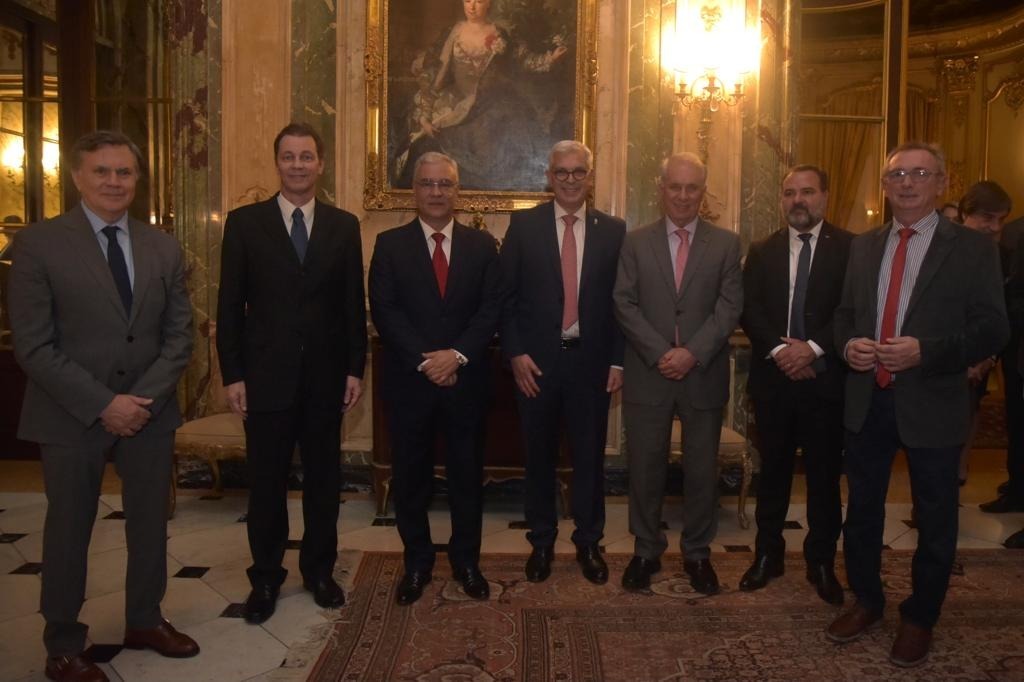Otero discussed with the two ministers the need to develop a joint, continent-wide strategy in response to rising food, energy, and fertilizer prices.

BUENOS AIRES, 5 July 2022 (IICA). In Buenos Aires, the ministers of agriculture of Argentina and Brazil, Julián Domínguez and Marcos Montes, and the Director General of the Inter-American Institute for Cooperation on Agriculture (IICA), Manuel Otero, discussed the role of the two major agricultural producers in helping to deal with the threat to global food security posed by the perfect storm of crises that is taking shape.
Otero met with the Minister of Agriculture, Livestock and Fisheries of Argentina, Julián Domínguez, and the two officials were then joined for a working lunch by Brazil’s Minister of Agriculture, Livestock and Supply (MAPA), Marcos Montes, and Minister of Science, Technology and Innovation, Paulo Alvim, who were visiting the Argentine capital.
The two Brazilian ministers also accompanied Otero when he visited IICA’s office in Argentina to witness the formal handover of responsibilities to the Institute’s new Representative in that country, Fernando Camargo, MAPA’s former Secretary for Innovation, Rural Development and Irrigation. The day’s activities concluded with a reception at Brazil’s Embassy in Buenos Aires, given by Ambassador Reinaldo Salgado.
Otero discussed with the two ministers the need to develop a joint, continent-wide strategy in response to rising food, energy, and fertilizer prices.
The disruptions in global markets triggered by the war in Eastern Europe are adding to the difficulties caused by the Covid-19 pandemic and the recurrence of extreme weather events, due to the impact of climate change.
Domínguez shared with Otero details of the Strategic Plan recently presented by his ministry in Argentina, which includes initiatives related to connectivity and rural infrastructure, and the creation of tools to facilitate the processing of financing for producers. They also discussed sustainable stock raising, family farming, and the cooperative movement.
“The huge task facing IICA is that of defending and making people aware of our production methods in other parts of the world. At a time when the demand for food across the globe is growing, agricultural production represents an extraordinary opportunity for national growth and development in this region,” said Minister Domínguez.
“Geographical divisions,” he added, “only exist in people’s minds. Argentina, Brazil, Uruguay, and Paraguay share the same land mass and a common destiny. We are producing food and doing so in an environmentally responsible manner. We have to reject the arguments used as pretexts to question our production methods, which end up being used to justify tariff barriers.”
Brazilian Minister Marcos Montes, who was visiting Argentina for the first time since he took office as head of MAPA last April, emphasized the need for the agriculture sectors of his country and Argentina to work together to tackle the current challenges. One of the most critical is the rise in the international price of chemical fertilizers, as both nations are heavily dependent on imports of such products.
“We have to move ahead in a coordinated manner at this challenging time in international affairs. And we must show the strength and quality of our agricultural production because, given the situation in which we find ourselves, we have a huge responsibility to guarantee food security across the globe,” Montes observed.
Montes also highlighted IICA’s work in seeking consensus in the Americas, and its role as a spokesperson for the continent’s interests in international forums.
Otero highlighted the alignment of the agenda of the ministries of agriculture of Brazil and Argentina with IICA’s agenda aimed at increasing the agricultural integration of the two countries and their insertion in global markets.
The Director General of IICA also discussed with the two ministers the possibility of organizing an inter-ministerial meeting with the participation of the Latin American Integration Association (ALADI), and the need to stimulate intra-regional food trade, which is negligible in Latin America and the Caribbean compared with other blocs like the European Union.
South-South cooperation
During his visit to Buenos Aires, Otero also took part in the launch of Agroedutec, a program under which some 5000 students from 100 agricultural technical schools in Argentina will receive training in the use of digital technologies and their application in agriculture.
The project was promoted by the Chief of the Cabinet of Ministers of Argentina, working with the ministries of education and agriculture. IICA then designed the initiative, in collaboration with Microsoft and Bayer, and with support from the World Bank.
The IICA Director General also met with the head of the National Agricultural Technology Institute (INTA), Mariano Garmendia, the Undersecretary for Latin American and Caribbean Affairs at the Foreign Ministry, Gustavo Martínez Pandiani, and the head of the White Helmets, the Argentine agency for international cooperation and humanitarian assistance, Sabrina Frederic.
With the three officials, Otero discussed ways of expanding the joint South-South cooperation projects involving Argentina and IICA that have been implemented successfully in recent years to boost food security in the Caribbean and Central American countries.
More information:
Institutional Communication Division
comunicacion.institucional@iica.int











